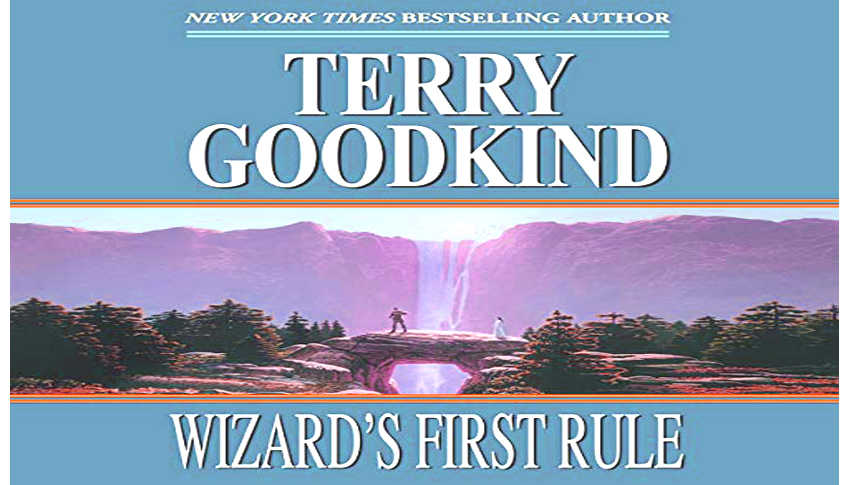

I could hardly focus on my other reading between volumes. I could not stop reading, even at the cost of studying for my exams. I remember very few books that held me like SOT. Still - his mastery of suspense is amazing. there are too many abstract ideas and too little plot to support them. Naked Empire is not perfectly integrated. I am sorry to say, though, that I think the last 2 novel are far from his best. But Goodkind of course manages to create something new, which is what makes his writing great. Sometimes I recognize Hanibal's tactics, or scenes that seemed to pop out of the war of the Greeks and the Persians. They prove a deep research on historical battles. I think Goodkind's war scense are the best I've ever read in ficiton. I wonder - what are your favorite books in the series? Mine is currently Stone of Tears and Faith of the Fallen. I ordered it as soon as it came out and read it too. I read all of it before the last volume (Naked Empire) was published.
#Terry goodkind sword of truth rules series
I started reading the Sword of Truth series last year. When I first saw your nick I thought of Goodkind, who likes the word scowl like no author I've ever read. The books are all over the place - Pillars of creation, as you note, doesn't even have much of the main characters! And the wizard's rules don't all fit together - in particular the "magic of forgiveness" one doesn't fit in with the hard-line Objectivism he seems to subscribe to now.īy the way, do you read any other fantasy? My only problem with the sword of truth series is this disjointedness. I agree that he probably won't be able to resolve the conflicts between his earlier and later novels by the series's end. As such he seems to have completely abandoned them.

The Keeper and the Creator in WFR and SoT are pretty serious judeo-christian allusions and don't fit in with what he's writing now. That said, I definitely agree that in his old interviews, he sounds much less like an Objectivist, and in his current ones, he sounds like Leonard Peikoff. Scowler, it sounds like you've got a problem with Terry's current outlook. Well I think based on Rand's philosophy, Richard's "self-sacrifices" can be seen in terms of him doing things for people he values, because it's worth it to him to help those people. It's like reading history, with every plodding detail narrated at length-at great length. It seems more like a saga, to me, and not a novel at all. Will it never end? He seems to be milking it for all it's worth, and to me, it isn't worth anywhere near eight volumes, let alone whatever number of volumes it finally comes out to. I guess I just don't like fantasy.Īnother problem I have with the series is that it seems to be, literally, the neverending story. Why could it not simply be several kingdoms at war with each other, without magic? Of course, then it would not be fantasy. I can not understand why it is necessary to inject magic into the story at all. They dare not let it go out of existence, therefore. Soul of the Fire's premise is that the world they live in would self destruct without magic. While I appreciate the heroism of the main characters, I really don't like the extreme emphasis on magic. The one I just finished reading, Soul of the Fire, seemed to be parodying the Clintons rather closely. I've read the first five volumes in the Sword of Truth series, so I guess I haven't gotten to the ones where Goodkind is more clearly Objectivist. I find reading philosophal treatises tedious books like Atlas and the Sword of Truth series add a little sugar to help the medicine go down. By Naked Empire, he has almost completely stepped outside of mere fantasy writing in favor of being philosophically didactic (to no small outcry from the Sword-and-Sorcery sycophants, who feel he is being more pedantic).īut he is still one of my favorite authors. For example, consider how many times Richard sacrifices himself for the sake of others.įaith of the Fallen is probably his best book, and certainly reminiscent of Rand's writing. Much like myself, there are certain topics where he would not seem to be in complete concordance. I don't think he refers to himself as an Objectivist, however. The Wizard's Rules are meant to be paraphrasal of her core values("The only sovereign I can allow to rule me is reason") as well as some of his personal philosophical views. Terry's own favorite novel is The Romantic Manifesto. I am also part of a community of his fans, and an admin on his web site. I was introduced to Rand via Terry's books, Skywalker.


 0 kommentar(er)
0 kommentar(er)
